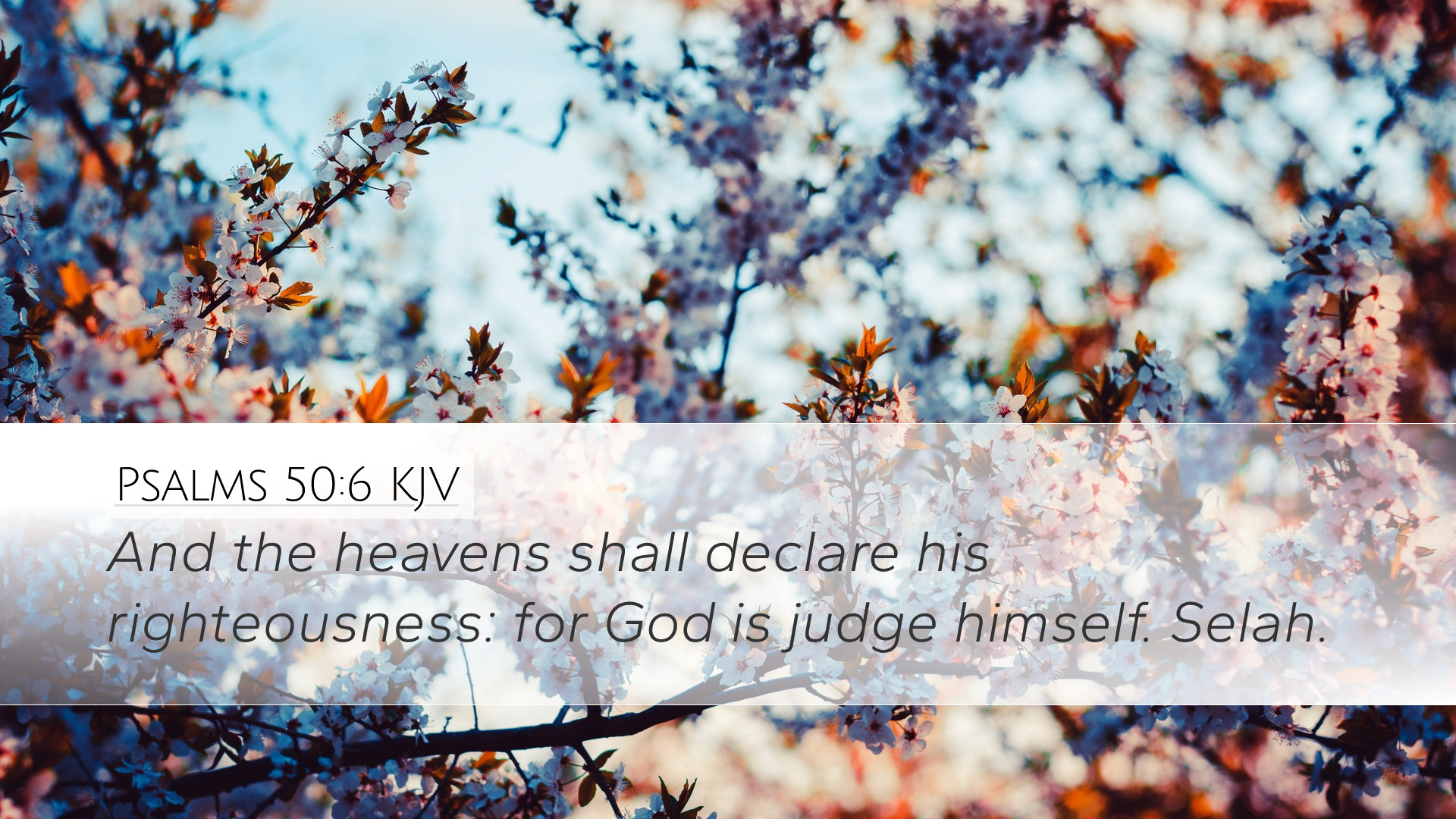Psalms 50:6 Commentary
Psalms 50:6 states: "And the heavens shall declare his righteousness: for God is judge himself." This verse encapsulates the theme of God's sovereignty and the universal acknowledgment of His justice and righteousness.
Introduction
The 50th Psalm serves multiple purposes: it is a call to worship, a divine indictment against empty rituals, and a proclamation of God's righteousness. The psalmist, traditionally attributed to Asaph, emphasizes God’s role as both Creator and Judge. In this context, verse 6 summarizes the purpose of God’s judgment and the declaration of His righteousness through creation.
The Theological Significance of Divine Judgment
Matthew Henry emphasizes the gravity of God being the supreme judge. His commentary reflects on the fact that all creation is a witness to God's righteousness. God's judgments are not confined to human understandings of justice but are fundamentally grounded in His holy character. Every action and decision made in the world is subject to His ultimate judgment.
According to Albert Barnes, the declaration of God's righteousness from the heavens suggests that even the celestial bodies participate in proclaiming God's attributes. The concept illustrates that there is no escape from God's judgment; it is as ubiquitous as the heavens themselves. Creation itself testifies to God's nature and justice, reinforcing the idea that humanity cannot hide its transgressions from the divine gaze.
Creation As Witness to God's Righteousness
Adam Clarke expounds upon the theme of creation bearing testimony to its Creator. He notes that the heavens—symbolizing both the skies and the celestial bodies—reflect the order, beauty, and reliability of God’s character. Their consistent movements and the stability of the cosmos serve as a reminder of God’s sovereignty and moral perfection. Clarke suggests that the regularity of the heavens stands in stark contrast to the fickleness of human morality, thereby amplifying the accountability of humankind.
Universal Acknowledgment
The line, "for God is judge himself," serves as a vital reminder for the faithful and the unfaithful alike. We must recognize God's ultimate authority over all creation. Matthew Henry posits that this universality is essential; all creation is under God's watchful eye, making every action significant. There is no partiality with God; He judges with perfect fairness, and this righteous judgment leads to accountability.
The Responsive Creation
The psalm expresses that not only do the heavens declare God's righteousness, but they also respond to God's demands for righteousness from humankind. Albert Barnes asserts that creation declares God's holiness, challenging believers to align their lives with His character. The expectation is set: if the heavens proclaim God's justice, then those He has created should reflect that righteousness in their own conduct.
Implications for Humanity
There is a stark warning contained within this psalm. As Adam Clarke remarks, neglecting to respond appropriately to God’s righteousness invites His judgment. The divine call to righteousness echoes through time and calls forth the faithful to assess their lives against the backdrop of God's moral law.
The Call to Righteous Living
In light of God's judgment, Matthew Henry warns against mere ceremonial religion devoid of moral integrity. He exhorts believers to adopt a transformative holiness that reflects the character of God. This call extends beyond rituals and enters the realm of daily living; thus, true worship is the demonstration of justice, mercy, and humility.
The Hope of Justice
While the theme of judgment may resonate as fearful, it also invites hope. As Albert Barnes points out, understanding God as a righteous judge reassures the faithful of eventual justice for the oppressed. God will not overlook injustices; instead, He will rectify them. The heavens proclaim not only God’s power but also His faithfulnness to correct all wrongs.
Conclusion
Psalms 50:6 serves as a profound reminder of God’s supreme authority and the universal declaration of His righteousness. Through the insights of Matthew Henry, Albert Barnes, and Adam Clarke, we are challenged to embrace the righteousness of God in our lives and to recognize our accountability to Him. The heavens declare His glory, and we, as His creation, must respond by living lives that reflect His holy and just character.


